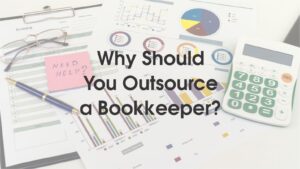The Benefits of Using Bookkeeping Services for Small Business
As a small business owner, managing your bookkeeping can be time-consuming and tedious, taking you away from the more important aspects of running your business. Outsourcing your bookkeeping can be a smart solution to this problem, allowing you to focus on growing your business and improving your bottom line. Discover a comprehensive outsourcing guide for small business bookkeeping, from basics to selecting the perfect service.
What is Outsource Bookkeeping?
Bookkeeping is recording financial transactions for a business, including sales, purchases, payments, receipts, and more. Bookkeeping is essential, tracking financial performance and forming the basis for reports, tax returns, and financial statements.
Why Outsource Bookkeeping for Small Business?
Outsourcing bookkeeping can offer several benefits for small businesses, including:
Time-saving: Outsourcing your bookkeeping allows you to focus on other important aspects of your business, such as sales, marketing, and customer service.
Cost-effective: Outsourcing bookkeeping can be more cost-effective than hiring an in-house bookkeeper, as you can avoid the costs associated with payroll taxes, benefits, and overhead.
Expertise: Expert bookkeepers efficiently manage financial records, ensuring accuracy and up-to-date information with their professional expertise.
Scalability: Outsourcing bookkeeping can help your business to scale more easily, as you can easily adjust the level of service you need as your business grows.
Compliance: Professional bookkeepers can help you to stay compliant with tax laws and regulations, reducing the risk of penalties and fines.
Steps to Outsourcing Your Small Business Bookkeeping
Determine Your Bookkeeping Needs
Before you start looking for a bookkeeping service, you need to determine your bookkeeping needs. Identify transaction types/volume, reporting needs, and necessary software/tools for accurate bookkeeping of your business.
Research Potential Bookkeeping Services
Outsourced bookkeeping services are available, so it’s important to research potential providers to find the one that best fits your needs. Look for bookkeeping services that have experience working with businesses of a similar size and in your industry.
Evaluate Bookkeeping Service Options
Once you have identified potential bookkeeping services, evaluate each option by considering factors such as pricing, level of service, and experience. You should also read reviews and ask for references to ensure that the service is reputable and reliable.
Choose a Bookkeeping Service
After evaluating your options, choose the bookkeeping service that best meets your needs. Make sure to review the terms of the contract carefully and negotiate any terms that don’t align with your expectations.
Provide Access and Information
After selecting a bookkeeping service, grant them access to your financial records and required software/tools. Make sure to communicate clearly and regularly to ensure that your bookkeeping is accurate and up to date.
Conclusion
Outsourcing your small business bookkeeping can be a smart solution that offers several benefits. By following these steps, you can find the right small business bookkeeping services and ensure that your financial records are accurate and up to date, allowing you to focus on growing your business and improving your bottom line.




